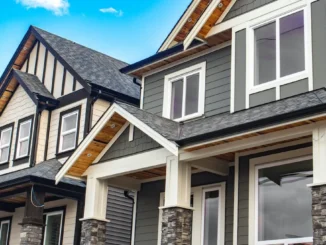
When Chris L. and his husband bought their first home together in September 2023—a beautiful midcentury modern in Concord, CA—the next question became what Chris should do with the townhouse he’d bought on his own nine years earlier.
While his old home was certainly more modest than his new property, it has one huge thing going for it: a 2.65% mortgage rate.
“My mom used to always say, ‘Once you sell something, you can’t get it back,’” Chris says.
While many homebuyers sell their first property when moving onto their next, Chris was reluctant to part with such a stellar mortgage rate.
“It’s a gem I want to hang on to,” he explains.
So rather than selling, he decided to rent it out instead.
“It’s challenging to have two mortgages, but I think it’s worth it,” he says.
Chris’ decision to rent it out rather than selling it makes a lot of sense in today’s housing market, where mortgage rates now hover above 7%.
Homeowners who, like him, were lucky enough to snag the record-low interest rates of 2021–22 are hanging on to these properties and filling them with tenants instead.
“Among repeat homebuyers in 2023, 2% reported renting out their home to others,” says Danielle Hale, chief economist at Realtor.com®.
An additional 8% reported not planning to sell, without specifying what they’d do with the property.
Taken together, that could mean that 1 in 10 homebuyers is holding on to the real estate they already own—and could become a whole new generation of de facto landlords.
Why renting versus selling makes sense today
Real estate agents have also noticed an uptick in homebuyers renting out their previous properties.
“I know a couple who inherited a property with a low-interest mortgage,” says Mike Rhoads, president of Wild North Home Offers in Raleigh, NC.
“Instead of selling it to us, they decided to renovate it and turn it into a rental property. The rent they receive brings in extra cash flow each month.”
In some cases, this scenario can give birth to a whole new career.
“One couple I know of began renting versus selling because doing so provided them with a steady stream of income,” says Mike Wall, a real estate agent with eXp Realty/EZ Sell Homebuyers in Dayton, OH.
“They have since acquired more rental properties, leveraging low interest rates to build a profitable real estate portfolio.”
Another development that’s encouraging homeowners to rent out versus sell is the array of websites that cater to mom-and-pop landlords such as Avail, where individuals like Chris can easily post rental listings and screen applicants.
“I did two weeks of showings with around 20 to 30 people showing up per day,” Chris recalls.

After checking their credit scores and narrowing it down to four to five applicants, he offered the apartment to a tenant who moved in in February.
How do the dollars stack up?
Chris and his partner bought their new larger home for $1.35 million with a mortgage at a fixed interest rate of 7.5%, which costs them around $7,000 per month.
Meanwhile, Chris’ townhome brings in $3,200 a month in rent, which more than covers the property’s outstanding monthly mortgage payment of $1,670—with plenty left over to help cover the costs of their new house.
The benefits of renting out your home
Many homebuyers sell their original digs because they need that cash as a down payment on their next property.
However, provided you don’t have to sell to buy, the advantages of renting out are considerable.
Investment properties bring in passive income, which you can put toward a new property or other purposes.
You will also continue to build equity in your original property, which is a nice plus for your net worth.
If you’re relocating, holding on to your old home also allows you to test the waters of a new neighborhood without giving up the old in case you want the option to return.
“Returning to the same area can often be more expensive versus keeping the property and letting it pay for itself with a renter while you are away,” says Cara Ameer, a real estate agent with Coldwell Banker, licensed in California and Florida.
Yet whether juggling two mortgages is worth the risk of spreading yourself too thin hinges heavily on what kind of interest rates you have in the balance.
“The major difference between [today’s] 7% borrowing costs and [previous] mortgage costs—nearly two-thirds of which are under 4%—creates an incentive to try to hold on to existing debt, if it is possible,” says Hale.
Mortgage interest rates are not the only reason renting out rather than selling is on the rise.
“The fact that rents remain high due to a decades-long period of underbuilding has also contributed to this phenomenon,” says Hale.
When rentals are in high demand and rents are high, these accidental landlords can reap major gains.
But if rents tumble or a rental sits vacant, selling the home, even with its low mortgage, might be the better option.
The risks of renting out your old home
Homeowners who are considering renting out their old place should also weigh whether they’re up for the substantial responsibility of becoming a landlord.
Ameer lists a few of the responsibilities: Do you know how to properly screen tenants?
Do you know the legalities of what you can and cannot do with today’s landlord-tenant laws?
How will you handle the legalities of a tenant who is late paying rent or doesn’t pay at all—or, for that matter, the classic call about a broken dishwasher or a clogged toilet at 3 a.m.?
These factors can eat up a sizable chunk of time and potentially add to your stress levels.
Also, remember it’s not just a matter of covering your mortgage on the home you are renting out.
Real estate taxes and insurance are additional costs, as well as maintenance and repairs.
“Many homeowners don’t understand the tenant isn’t going to treat the house the same as you would,” says Nathaniel Hovsepian, owner of The Expert Home Buyers in Augusta, GA.
“You need to factor in more maintenance and upkeep over time.”
Consider hiring a competent property manager to check on the house and handle repairs that crop up. That’s another expense eating into your rental profits, but it might be vital.
Another thing to check before renting out an existing property: your mortgage terms.
“Many sub-3% mortgages are found in owner-occupied properties,” says Jameson Tyler Drew, president of Anubis Properties, in the Los Angeles area.
“They are the types of loans that involve first-time homebuyers and other tax credits. If you rent this kind of property out, you risk committing occupancy fraud. You could be on the hook to pay back both the mortgage and these tax breaks in full if you’re caught renting out your home, which I have seen happen.”
Similarly, if your property is part of a homeowners association, you might be running afoul of its no-renting regulations, so double-check those guidelines.
Otherwise, your cash cow could wind up costing you.
As for concerns about the hassles of finding a reliable renter and maintaining his previous property, so far Chris has found the process of running a rental fairly easy.
“So far she’s good about paying rent on time and is no trouble,” he says.
“If being a landlord turned into a headache, I might sell later, but who knows. So far, it’s a good way to have some passive income and move up, and still keep something for retirement purposes or to pass down to the next generation.”



